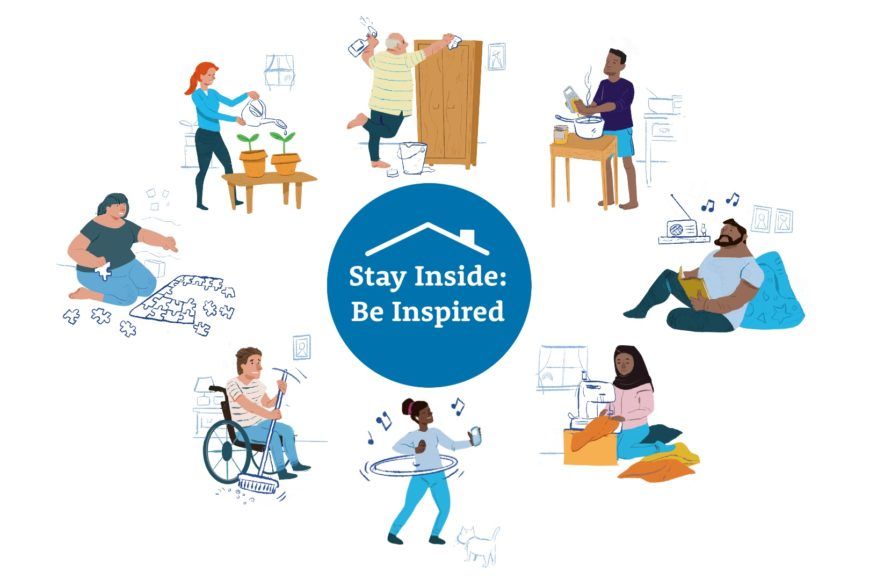New Resources on person-centred active support and the importance of structure “Stay Inside: Be Inspired”

Since March, our world has changed quite substantially – bringing uncertainty, anxiety and isolation for many. Staying active and trying new things, and creating structure and routine, have been identified as helping all of us to keep healthy and happy at this time, although they are, of course, important for our well-being even in normal circumstances.
Children and adults with intellectual and developmental disabilities (such as those with learning disabilities, those on the autism spectrum and those with other similar conditions) often need help to keep active, try new things and find helpful routines. Some will just need some encouragement and help to organise opportunities; others will need very substantial support. Active Support is about enabling and empowering people to make the most of opportunities available to them. When one set of opportunities is not available, then we need to look for others and for new ways to provide support.
We have been approached with many stories about the difficulties people and their families have been facing as a result of coronavirus restrictions – reduction in support, closure of day services and schools, closure of public and leisure facilities, shops etc. Both staff and families have been asking for help to find things for people to do and to help people cope with the changes in their routine.
We have also been told many stories of how people have been coping and how they have been creatively using the principles of person-centred active support (sometimes without realising) in order to help people keep active and connected, and to reduce stress and anxiety. We heard about one gentleman who got the opportunity to wash the car which he absolutely loved, because the car wash at the local garage was closed. Another example came from the parent of a young autistic lad who had not been able to go to school – she started to get her son involved in some of the everyday tasks around the home – little things initially – setting the table, clearing away dishes, making a snack etc. Not only did these give him new sources of activity to help keep him busy and develop useful self-care skills but they provided a new helpful structure as they were things that generally were associated with key times of the day. This helped to reduce his anxiety caused by the loss of the routine normally associated with school.
United Response and the Tizard Centre were supposed to celebrate 20 years of working together to implement and research active support with an international conference earlier this month. Obviously, given the global pandemic, this had to be cancelled. We decided to work together to produce some resources that might help families, personal assistants and support workers who were trying to help people through changes in their normal routines and the sudden loss of sources of activity and predictability. During April and May we developing the “Stay Inside: Be Inspired” resources and these were launched in early June. Although these resources are a response to the Coronavirus pandemic, they will hopefully be useful far beyond the end of the pandemic.
In addition to the written guide, there is a poster which summarises the key elements of person-centred active support. These are free to download or you can request a free hard copy to be posted to you. These focus on helping you understand the key elements of active support and what is needed to ensure that we provide predictability and consistency and learn as we go.
We have set up a Facebook group which anyone who is providing support to children and adults with disabilities in any environment can join. We will keep you updated with new resources and opportunities and also discuss questions and opportunities.
We have also been running some introductory webinars. We have now run four webinars and a video from the introductory webinars will be available soon. There are also links to other video resources related to active support.
The next opportunity for people to get involved and take their learning further, will be a series of support sessions which will give participants the opportunity to think about and plan how to involve someone they support (a child or an adult) in new (or more parts of) activities. These sessions will be interactive in nature and are likely to last around 1 ½ hours. Participants will work in pairs or small groups with the support of one of us (Julie, Bev, John and Alan).
There will be two sessions which will be specifically for families:
- Tuesday 8th September – 1030 – 1200
- Tuesday 6th October – 1030 – 1200
There will also be two sessions for those working in a service setting as part of a team:
- Thursday 3rd September 1100 – 1230
- Monday 14th September 1300 – 1430
For more information about these sessions please see the Stay inside: Be Inspired website.